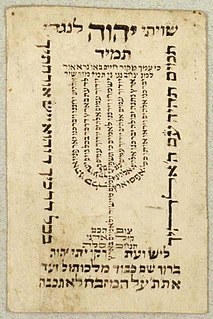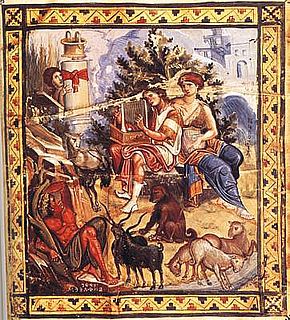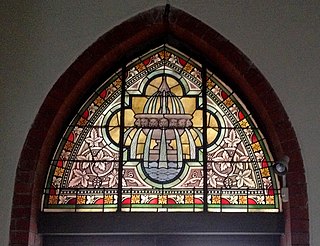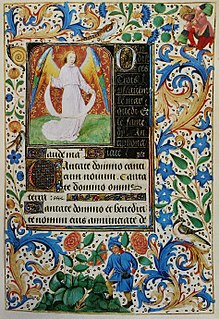
Thomas Tallis was an English Renaissance composer who occupies a primary place in anthologies of English choral music. He is considered one of England's greatest composers, and he is honoured for his original voice in English musicianship.
"Old 100th" or "Old Hundredth" is a hymn tune in long metre, from second edition of the Genevan Psalter. It is one of the best known melodies in many occidental Christian musical traditions. The tune is usually attributed to the French composer Louis Bourgeois.
John Bennet was a composer of the English madrigal school. Little is known for certain of Bennet's life, but his first collection of madrigals was published in 1599.

Psalm 98 is the 98th psalm of the Book of Psalms, beginning in English in the King James Version: "O sing unto the Lord a new song; for he hath done marvellous things". The Book of Psalms starts the third section of the Hebrew Bible, and, as such, is a book of the Christian Old Testament. In the slightly different numbering system in the Greek Septuagint version of the Bible, and in the Latin Vulgate, this psalm is Psalm 97. In Latin, it is known as "Cantate Domino". The psalm is a hymn psalm, one of the Royal Psalms, praising God as the King of His people.

Psalm 67 is the 67th psalm of the Book of Psalms, beginning in English in the King James Version: "God be merciful unto us, and bless us; and cause his face to shine upon us". In the slightly different numbering system of the Greek Septuagint version of the Bible, and in the Latin Vulgate, this psalm is Psalm 66. In Latin, it is known as "Deus misereatur". Its theme is a prayer for God's mercy, blessing and light.

Psalm 95 is the 95th psalm of the Book of Psalms, beginning in English in the King James Version: "O come, let us sing unto the LORD: let us make a joyful noise to the rock of our salvation.". The Book of Psalms starts the third section of the Hebrew Bible, and, as such, is a book of the Christian Old Testament. In the slightly different numbering system in the Greek Septuagint version of the Bible, and in the Latin Vulgate, this psalm is Psalm 94. In Latin, it is known as "Venite exultemus". The psalm is a hymn psalm, one of the Royal psalms, praising God as the King of His people. Psalm 95 identifies no author, but Hebrews 4:7 attributes it to David. The Vulgate also names David as the author.

Psalm 30 is the 30th psalm of the Book of Psalms, beginning in English in the King James Version: "I will extol thee, O LORD; for thou hast lifted me up". The Book of Psalms is part of the third section of the Hebrew Bible, and a book of the Christian Old Testament. In the slightly different numbering system in the Greek Septuagint version of the Bible and in the Latin Vulgate, this psalm is Psalm 29. In Latin, it is known as "Exaltabo te Domine". It is a psalm of thanksgiving, traditionally ascribed to David upon the building of his own royal palace.

Psalm 146 is the 146th psalm of the Book of Psalms, beginning in English in the King James Version, "Praise ye the LORD. Praise the LORD, O my soul." The Book of Psalms is part of the third section of the Hebrew Bible, and a book of the Christian Old Testament. In the Greek Septuagint version of the Bible, and in its Latin translation in the Vulgate/Vulgata Clementina, this psalm is 145 in a slightly different numbering system. In Latin, Psalm 146 is known as "Lauda anima mea Dominum".

Psalm 147 is the 147th psalm of the Book of Psalms, beginning in English in the King James Version, "Praise ye the LORD: for it is good to sing praises". The Book of Psalms is part of the third section of the Hebrew Bible, and a book of the Christian Old Testament. In the Greek Septuagint version of the Bible, and in its Latin translation in the Vulgate/Vulgata Clementina, this psalm is divided into Psalm 146 and Psalm 147 in a slightly different numbering system. In Latin, Psalm 146 is known as "Laudate Dominum quoniam bonum psalmus", and Psalm 147 as "Lauda Jerusalem Dominum".

Psalm 42 is the 42nd psalm of the Book of Psalms, often known in English by its incipit, As the hart panteth after the water brooks. The Book of Psalms is part of the third section of the Hebrew Bible, and a book of the Christian Old Testament. In the Hebrew Bible, Psalm 42 opens the second of the five books (divisions) of Psalms. In the Greek Septuagint version of the bible, and generally in its Latin translations, this psalm is Psalm 41 in a slightly different numbering system, although the Nova Vulgata translation follows the Hebrew numbering. The psalm is a hymn psalm. It is one of twelve psalms attributed to the sons of Korah.

Psalm 1 is the first psalm of the Book of Psalms, beginning in the English King James Version: "Blessed is the man". The Book of Psalms is part of the third section of the Hebrew Bible, and a book of the Christian Old Testament. In Latin, this psalm is known as Beatus vir or Beatus vir, qui non abiit.

Psalm 2 is the second psalm of the Book of Psalms, beginning in English in the King James Version: "Why do the heathen rage". In Latin, it is known as "Quare fremuerunt gentes". Psalm 2 does not identify its author with a superscription. Acts 4:24–26 in the New Testament attributes it to David. According to the Talmud, Psalm 2 is a continuation of Psalm 1.

Psalm 93 is the 93rd psalm of the Book of Psalms, beginning in English in the King James Version: "The Lord reigneth, he is clothed with majesty". The Book of Psalms is part of the Hebrew Bible and the Christian Old Testament. In the slightly different numbering system of the Greek Septuagint and Latin Vulgate versions of the Bible, this psalm is Psalm 92. Its Latin title is Dominus regnavit, decorem indutus est. It is the first of a series of psalms which are called royal psalms as they praise God as King.

Psalm 24 is the 24th psalm of the Book of Psalms, beginning in English in the King James Version: "The earth is the LORD's, and the fulness thereof". In the slightly different numbering system in the Greek Septuagint version of the Bible and the Latin Vulgate, this psalm is Psalm 23. In Latin, it is known as "Domini est terra et plenitudo eius orbis terrarum". The psalm is marked as a Psalm of David.

Psalm 25 is the 25th psalm of the Book of Psalms, beginning in English in the King James Version: "Unto thee, O LORD, do I lift up my soul.". The Book of Psalms is part of the third section of the Hebrew Bible, and a book of the Christian Old Testament. In the Greek Septuagint version of the Bible, and in the Latin Vulgate, this psalm is Psalm 24 in a slightly different numbering system. In Latin, it is known as "Ad te Domine levavi animam meam". The psalm, attributed to David, has the form of an acrostic Hebrew poem.

Psalm 36 is the 36th psalm of the Book of Psalms, beginning in English in the King James Version: "The transgression of the wicked saith within my heart". The Book of Psalms is part of the third section of the Hebrew Bible, and a book of the Christian Old Testament. In the Greek Septuagint version of the bible, and in its Latin translation in the Vulgate, this psalm is Psalm 35 in a slightly different numbering system. In Latin, it is known as "Dixit iniustus ut delinquat in semet ipso". The psalm is a hymn psalm, attributed to David.

Psalm 133 is the 133rd psalm of the Book of Psalms, beginning in English in the King James Version: "Behold, how good and how pleasant it is for brethren to dwell together in unity". The Book of Psalms is part of the third section of the Hebrew Bible and a book of the Christian Old Testament. In the Greek Septuagint version of the bible, and in its Latin translation in the Vulgate, this psalm is Psalm 132 in a slightly different numbering system. In Latin, it is known as "Ecce quam bonum". The psalm is one of the fifteen Songs of Ascents, and one of the three Songs of Ascents consisting of only three verses.

Psalm 70 is the 70th psalm of the Book of Psalms, beginning in English in the King James Version: "Make haste, O God, to deliver me". The Book of Psalms is part of the third section of the Hebrew Bible, and a book of the Christian Old Testament. In the Greek Septuagint version of the Bible and in the Latin translation, the Vulgate, this psalm is Psalm 69 in a slightly different numbering system. In Latin, it is known as "Deus, in adiutorium meum intende". The entire psalm is virtually identical to the closing verses of Psalm 40. The first verse of Psalm 70 became the liturgical opening prayer to every hour of the Liturgy of the Hours.

Psalm 96 is the 96th psalm of the Book of Psalms, a hymn. The first verse of the psalm calls to praise in singing, in English in the King James Version: "O sing a new song unto the Lord". Similar to Psalm 98 and Psalm 149, the psalm calls to praise God in music and dance, because he has chosen his people and helped them to victory. It is one of the royal psalms praising God as the King of His people. In the slightly different numbering system used by the Greek Septuagint and the Latin Vulgate, this psalm is Psalm 95.

















